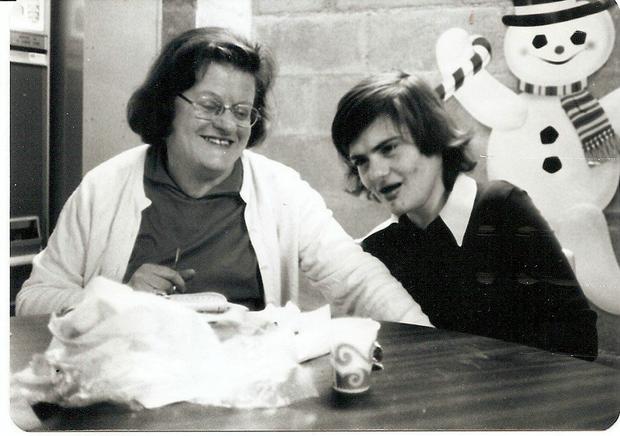N.Y. bills for costs of care after alleged cases of abuse
ALBANY, N.Y. -- Bill Liblick was shocked to learn that his sister, a disabled woman with the mind of a 1-year-old, had repeatedly been sexually assaulted at a state-run group home. Then, after her death, he was astonished again when he received a $1.6 million bill from the state for the cost of her care.
Liblick says it was a coldhearted attempt by the state to get its hands on the money her estate eventually won in a lawsuit over her abuse.
"They were found negligent and grossly negligent and now they want to be rewarded?" said Liblick, who secured a $2.5 million verdict against New York last month for the assaults Paula Liblick endured in 2009.
At least three times in recent years, New York has pursued Medicaid reimbursement of $1 million or more from those who allegedly suffered devastating, even deadly, mistreatment while in state care. In two of those cases, the state eventually dropped its claims after the families contested them.
National experts say New York's pursuit of such claims appears to be highly unusual and is a misapplication of the 1993 federal law that requires states to recover, or "claw back," certain Medicaid costs from people's estates after their death.
"It's serious overreaching to attempt to recoup funding from people who have been abused in the system," said Susan Dooha, executive director of the Center for Independence of the Disabled, a nonprofit group in New York City. "It's very cynical, to say the least."
New York's Office for People with Developmental Disabilities declined to comment on any cases in particular but said that it is mandatory under the law to file claims for reimbursement against a patient's lawsuit proceeds and the estates of those who were over 55 or were receiving chronic care under Medicaid.
"Settlements can be reached depending on the circumstances," agency spokeswoman Jennifer O'Sullivan said.
But other experts said states have wide discretion in deciding whether to pursue such claims, noting that the law contains exceptions for various hardship situations. And they questioned the ethics of clawbacks for care that was abusive or deadly.
"Those particular facts are not something I've heard about in other states," said Michelle Lilienfeld, senior attorney in Los Angeles with the National Health Law Program, which works for health care access.
Wayne Turner, an attorney with the program in Washington, recalled a 1996 case where the District of Columbia's Medicaid agency clawed back part of a $350,000 settlement from a woman who died of AIDS from a blood transfusion, money that could have helped her three children go to college. After lawyers' fees, the family was left with $114,267, according to the federal appeals court ruling that upheld the claim.
"State Medicaid agencies have discretion to recoup funds," Turner said. "However, so often these anonymous decision makers can't see beyond written policies to consider the real-life impact on people's lives."
OPWDD said information on how many claims it has made against abuse settlements over the past five years was not readily available. A Freedom of Information request by The Associated Press for such material is pending.
Paula Liblick died in 2011 at age 62 after being in state care most of her life. The state agency wrote to her brother last year, extending its condolences while also informing him: "The full amount of $1,629,440.24 is now justly due and owing." His attorney has asked the state to detail its claim and substantiate the lien.
Paul Castellani, a former top official at OPWDD's predecessor agency, said liens in such cases appear to be a recent phenomenon and weren't pursued at the time he left state employment in 2005.
"It seems rather nasty," he said.
Attorneys in two other cases said the state likewise filed liens after they sued, alleging abuse.
One involved 33-year-old Rasheen Rose, who was severely autistic and died three years ago at a group home in New York City after being held down. A medical examiner ruled it a homicide. His sister received a $2.15 million settlement. One year after the lawsuit was filed, New York officials sent her a bill for nearly $11.7 million.
That was dropped after lawyers requested and obtained an itemized list of those expenses, attorney Rob Santoriella said.
Another was the case of a 22-year-old man, autistic, mentally disabled and non-verbal, identified in court papers only as K.C., who was taken unconscious in 2011 from an institution near Albany to a hospital, where he died a month later of pneumonia. His family said he was systematically abused, malnourished and beaten with sticks when he crawled off a mat where the staff kept him.
The family received a $2.25 million settlement, and as part of the deal, the state dropped its lien for $2.2 million for K.C.'s state care.
"I don't think it's a valid lien in the first place," said attorney Ilann Maazel, who represented K.C. "It seems they do have a choice."
In Paula Liblick's case, she was found with bruises and blood in her diaper, and authorities determined she had been sexually assaulted at different times at her group home in Orange County.
She died two years later of cardiac arrest in a hospital after she had somehow become infected with a dangerous Caribbean parasite, her brother said. Five staff members at the now-closed group home were fired, and nobody was ever charged, he said.
Liblick said the situation was particularly tragic for his sister, who was seen in a 1972 documentary at another state facility, on the floor, in her own urine and feces.
Said her brother: "There was never good care."
